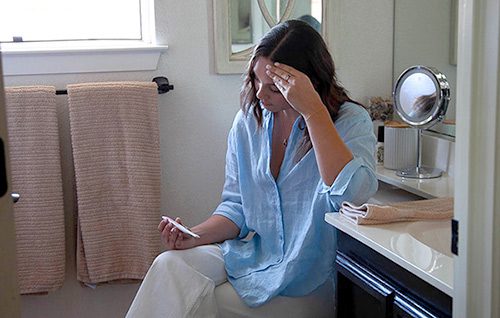
After nervously waiting the required three minutes, you held your breath and looked at the test. You prayed and demanded that the test have just one line. Your face flushed as you saw the two lines screaming “positive” at you.
If you’re reading this, then chances are this has happened to you! You may feel overwhelmed right now, along with guilt, shock, and resentment. You might even have exclaimed, “I’m pregnant?! Now what?”
Give yourself a few days to adjust to the reality that you are pregnant. It can be overwhelming figuring out what to do after you find out you’re pregnant, so start by giving yourself a few days to absorb this news. You’ll have some tough decisions ahead of you, so don’t rush into anything.
What should I do now?
Your first step after finding out you’re pregnant is getting prenatal care. Contact your OB-GYN to make an appointment, where you can find out how far along you are and learn how to have a healthy pregnancy. If you don’t have a doctor, you can find medical care near you at OptionLine.org. Enter your city, state, or zip code to find a pregnancy care center where you can get many prenatal care services for free, including pregnancy tests and ultrasounds.
At your first prenatal visit, the medical professional will confirm your pregnancy, perform a complete physical exam, including breast and pelvic exams, and ask about your medical history. You’ll typically have an ultrasound, where you can actually see your baby, later in your first trimester. However, every clinic does it differently, so ask about specific ultrasound timing and details when you schedule your initial visit.
Your doctor can also provide recommendations for a healthy pregnancy, like starting prenatal vitamins and eating a nutritious diet. Take time to take care of yourself, get plenty of rest, eat well, and drink lots of water. You’ll also want to stop smoking, drinking, using drugs, or taking any prescriptions that might harm your baby.
Who should I tell?
The next step is to share the news of your pregnancy with those you trust, like your best friend or a family member. It may be hard to talk to your parents about your pregnancy, especially if you’re not sure how you feel about it yet. Remember, your pregnancy could be a shock to them. Tap here for tips to have an open and honest conversation with your parents — and figure out what to do next.
Telling your boyfriend you’re pregnant can be intimidating when the pregnancy is unplanned. The important thing is that you tell him as soon as you find out you’re pregnant so he can process the information. Honesty and trust are the foundation of any relationship, so if you want to stay together, you can’t lie about what’s on your mind. Get advice on how to approach this conversation with him.
Some women find it comforting to tell someone that they’re pregnant, even if they’re not sure they want to be. Talking to someone can be an excellent way to work through your emotions, whether you’re scared, excited, or upset (or all three!)
I’m pregnant — now what do I do?
If you’ve just found out you’re pregnant, this may be one of your life’s most confusing and stressful times. You might feel as if your life is spiraling out of control, and you’re unsure about what you should do now that you’re pregnant.
More than likely, an unplanned pregnancy was not the plan you imagined for your life—not now, anyway. Maybe you thought you’d never find yourself in this position—considering abortion or adoption. But now that it’s you and your body, your future, and your decision, you may be left searching for answers and feeling alone.
You’re Not Alone
Some of your questions right now might include, “What do I do now? This is going to ruin my plans for the future”, “Should I put my child up for adoption?” or “Who can I turn to for help?”
Know that you’re not alone right now. Even though you might feel like you don’t have support, you’re not alone. And you’re not the first woman to go through this, as almost half of all pregnancies in the U.S. are unplanned.
Lifetime has peer counselors that you can speak to over the phone. Our peer counselors are women who placed their babies for adoption in the past. Another vital resource we can provide is access to a licensed, a third-party therapist.
By “third-party,” we mean that this counselor has no personal interest in whether or not you follow through with adoption. She is there to help you sort through the range of emotions you might be dealing with. It often helps to speak with a non-biased counselor who’s not directly assisting with your adoption.
And we also have staff working 24 hours a day, seven days a week, here to answer your questions. You can CALL or TEXT Lifetime Adoption at 1-800-923-6784. Or, if you’re not quite ready to talk on the phone yet about your situation, you can chat live on our website too.
What if I’m not sure I want to be a mom?
If you don’t feel ready to become a parent, you have options, including adoption or abortion. Some women find talking with a therapist, friend, partner, or supportive family member helpful as they consider their choices. You might also ask your doctor for guidance and support.
Resources, support, and information are available to help you right now. Knowing your options and becoming well-informed can help you feel more confident about whichever decision you make.
If you’re facing an unplanned pregnancy and aren’t sure whether parenting or having another child will work, you might be asking yourself, “Is adoption right for me?” Not only could adoption be right for you, but it’s also a loving and selfless choice that positively affects everyone involved. If you choose adoption, you can keep working toward your goals in life while also doing what’s best for you and your baby.
With open adoption, you can hand-pick your baby’s adoptive parents. Caroline Carver shares in this Pregnancy Help News story about her daughter PJ’s adoptive parents, “I realize that through them, my daughter has a life that is beyond my dreams…PJ has a mother and father. I have peace and tranquility knowing that my child has everything I could ever dream for her.”
You might wonder where to start if you’re considering adoption. By calling or texting Lifetime Adoption at 1-800-923-6784, you can get support and answers anytime, day or night, even right now!
Editor’s Note: This article was originally published on November 22, 2014, and has since been updated.
Mardie Caldwell, C.O.A.P., is nationally recognized as an expert on open adoption. A Certified Open Adoption Practitioner (C.O.A.P.), Caldwell is the founder of Lifetime Adoption Center, established in 1986. She has assisted in over 2,000 successful adoptions and was one of the first adoption professionals on the Internet.
Caldwell’s life work is dedicated to educating and helping birth parents find the right adoptive parents for their child. She spreads the word about modern adoption through speaking appearances, webinars, online resources, and as a podcast show host.
She has written several award-winning books, including So I Was Thinking About Adoption, the first book of its kind. There are many reasons women choose adoption, and this short book is a comprehensive resource to make the best plan for you and your baby. Caldwell wrote So I Was Thinking About Adoption as a handy guide to the details of the adoption process.
Caldwell has made over 150 media appearances, including ABC News, CBS News, Larry King Live, CNN Headline News, NBC’s The Today Show, CNN’s The Campbell Brown Show, NBC News, KGO Newstalk Radio, CNN’s Black in America II, MSNBC, Fox, PBS, BBC, and Dr. Laura.


![How to Use a Pregnancy Wheel Calculator [Video]](https://lifetimeadoption.com/wp-content/uploads/2020/04/pregnancy-wheel2-1-400x250.jpg)

0 Comments